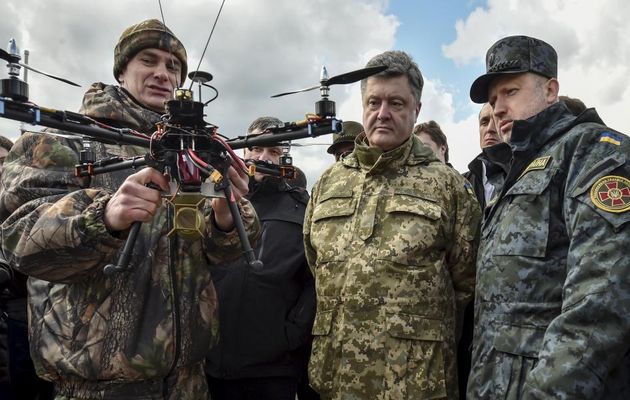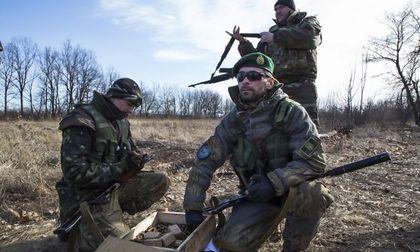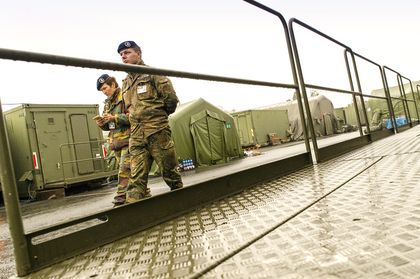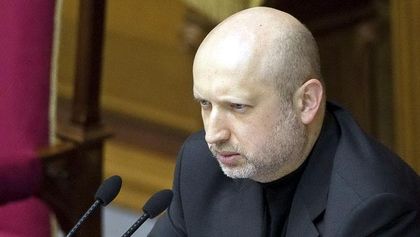Ukraine wants to join NATO
Evangelical politician Turchynov (head of the national Security Council) sets sights on joining NATO. Russia and Ukraine agreed new arms withdrawal.
Agencies, EurActiv · KIEV · 14 APRIL 2015 · 11:10 CET

Oleksander Turchynov, head of the national Security Council, told a session of the body that Ukraine saw Russian aggression as a "long-standing factor" and viewed NATO membership as "the only reliable external guarantee" of its sovereignty and territorial integrity.
“For the first time in history, a permanent member of the UN Security Council, which possesses the nuclear weapon, uses this factor to intimidate the international community and uses its military potential for annexation and seizing the territory of a European country", Turchynov denounced during the draft national security strategy presentation.
"Having abandoned the policy of non-alignment, which did not provide the territorial integrity of our country in the medium term, relying primarily on own capabilities, Ukraine reserves the right to take part in collective security systems”, he added.

UKRAINE AND THE NATO
Ukraine, at the centre of a geopolitical tug-of-war between Russia and the West, has grown close to the NATO alliance since its independence from the Soviet Union in 1991.
Turchynov has taken a new step in that approach, stating that European and Euro-Atlantic integration was now a priority for Ukraine's policies, and that the country would aim to coordinate its armed forces and intelligence services with those of the Western alliance.
The pro-Western leadership has written a document of military planning, where they explain a strategy designed to be implemented by 2020. Its main objective is the development of rules for the resumption of territorial integrity, restoration of peaceful development, and the integration into the EU.
NATO has said that membership is one day possible for Ukraine, but has declined to arm the Kyiv government on the grounds that, as a non-member, it does not qualify for military help under NATO's collective defence rules. Experts believed that Ukraine will not be able to qualify for membership in NATO in the next 20 years.
The new military doctrine drawn up by the National security and defence council will become policy once it has been endorsed by a decree from President Petro Poroshenko.
AGREEMENT ON ARMS WITHDRAWAL
Russia and Ukraine agreed Monday to call for the pullback of smaller calibre weapons from the front lines in eastern Ukraine as part of a fresh push to end the region's yearlong conflict.
Foreign ministers from the two countries, meeting with their French and German counterparts in Berlin, also agreed to support international monitors
"Everyone knows that we have a long path ahead of us", German Foreign Minister Frank-Walter Steinmeier, told reporters shortly after midnight. "But we're going to do everything we can to continue this process."
Russian Foreign Minister Sergey Lavrov said the parties were unable to agree on Ukraine's demands for the deployment of peacekeepers. He also criticized laws passed recently by the Ukrainian parliament, which he said were eroding the Minsk deal.

The Ukraine Crisis has prompted surge in military spending in Eastern Europe, according to SIPRI (Stockholm International Peace Research Institute)
“The Ukraine crisis has fundamentally altered the security situation in Europe,” Dr. Sam Perlo-Freeman, the head of SIPRI’s military expenditures project, said in a statement Monday. However, seven months after the NATO summit, “the impact on military spending is mostly apparent in countries bordering Russia,” he said.
Economic austerity policies in Western Europe are driving down defence budgets among the continent's five biggest spenders — France, Britain, Germany, Italy and Spain, the SIPRI report said.
But the situation is very different in nations with memories of life under communism, such as Poland and the Baltic states: spending on arms will rise this year by 50% in Lithuania, by nearly 20% in Poland, and by nearly 15% in Latvia, said SIPRI.
TURCHYNOV, AN EVANGELICAL POLITICIAN
The head of the national Security Council is a Baptist preacher, a writer and a movie screenwriter. The Evangelical Baptist Union of Ukraine has always expressed support of Turchynov.

Following the collapse of President Yanukovych's government, Ukraine's parliament named Mr Turchynov as speaker and interim prime minister, and then - after voting to depose Mr Yanukovych - as interim president, until Petro Poroshenko was sworn in as Ukrainian President on 7 June 2014.
He is the current Secretary of the National Security and Defence Council of Ukraine.
Published in: Evangelical Focus - europe - Ukraine wants to join NATO
